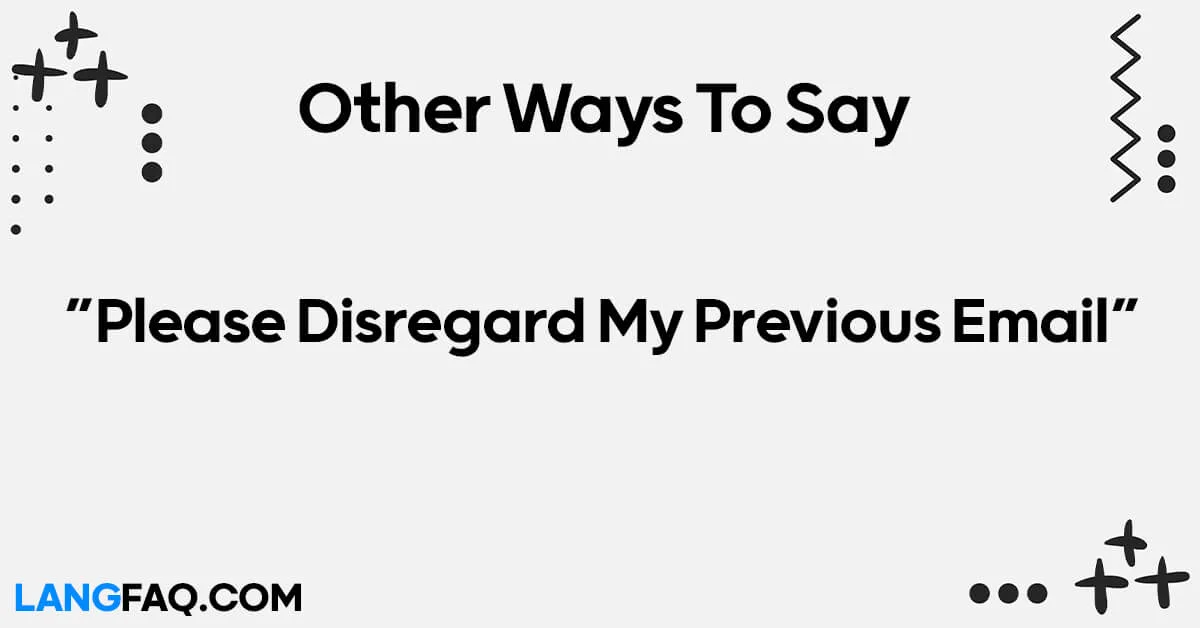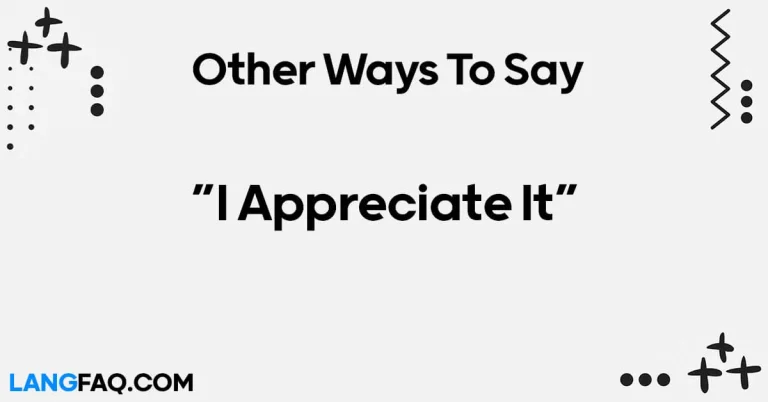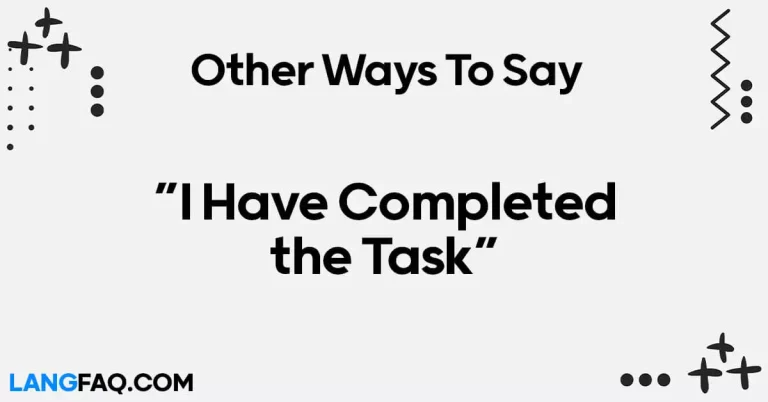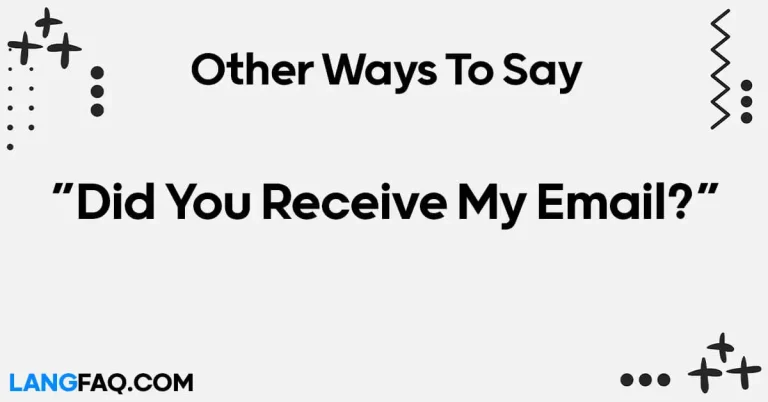In the dynamic world of email communication, expressing oneself clearly is paramount. This article unveils 12 diverse alternatives to convey the message “Please Disregard My Previous Email.” Elevate your email etiquette and master the art of effective communication with these invaluable substitutes.
12 Other Ways to Say “Please Disregard My Previous Email”
Here are 12 alternative ways to say “Please Disregard My Previous Email”:
- Disregard my earlier message.
- Kindly overlook my previous email.
- Let’s disregard the content of my last message.
- Please ignore the information in my prior email.
- Disregard the previous correspondence.
- My apologies; let’s start afresh.
- Let’s pivot the discussion from my last email.
- Allow me to clarify the previous message.
- Kindly disregard the outdated information.
- Let’s move forward, ignoring the last email.
- Disregard the previous communication; here’s the updated information.
- Please overlook any confusion from my last message.
Here’s a table with meanings and examples for the 12 alternative ways to say “Please Disregard My Previous Email”:
| Alternative Expression | Meaning | Example |
|---|---|---|
| Disregard my earlier message | Request to ignore a previously sent email | “I made an error in my last email, please disregard it.” |
| Kindly overlook my previous email | Politely asking the recipient to ignore the prior message | “Kindly overlook my previous email; there was a mistake.” |
| Let’s disregard the content of my last message | Suggesting to dismiss the information in the previous email | “There was a mix-up; let’s disregard the content earlier.” |
| Please ignore the information in my prior email | Requesting the recipient to not consider the earlier message | “Apologies for the confusion; please ignore my prior email.” |
| Disregard the previous correspondence | Asking to overlook the entire previous email chain | “The situation has changed; kindly disregard the correspondence.” |
| My apologies; let’s start afresh | Expressing regret and proposing a fresh beginning | “I apologize for any confusion; let’s start afresh.” |
| Let’s pivot the discussion from my last email | Suggesting a change in the topic or direction | “The focus has shifted; let’s pivot the discussion from my last email.” |
| Allow me to clarify the previous message | Requesting permission to provide additional clarification | “There might be confusion; allow me to clarify the previous message.” |
| Kindly disregard the outdated information | Asking to ignore information that is no longer valid | “Upon review, the details have changed; kindly disregard the outdated information.” |
| Let’s move forward, ignoring the last email | Proposing to continue the conversation without referring to the previous email | “To avoid confusion, let’s move forward, ignoring the last email.” |
| Disregard the previous communication; here’s the updated information | Instructing to disregard the old message and providing fresh information | “Disregard the previous communication; here’s the updated information you need.” |
| Please overlook any confusion from my last message | Requesting the recipient to dismiss any potential confusion | “If there’s any confusion from my last message, please overlook it.” |
Effectively conveying the need to disregard a previous email is crucial in maintaining clear communication. These alternative expressions offer a range of polite and professional ways to rectify errors, update information, or redirect the conversation. Choosing the right phrase depends on the context and the desired tone of the communication.
Is It Correct to Say “Please Disregard My Previous Email”?
Yes, saying “Please disregard my previous email” is a correct and appropriate way to communicate that the recipient should ignore or overlook the content of a previous email. This phrase is commonly used in professional settings when there’s a need to rectify an error, provide updated information, or redirect the focus of the communication.
When to Use:
- Correction of Errors: If you’ve made a mistake or provided inaccurate information in your previous email, using this phrase is a polite way to communicate the correction.
- Updated Information: When there are changes or updates to the information you shared in the earlier email, requesting the recipient to disregard the previous content is a clear way to convey the revised details.
- Change in Focus: If there’s a need to shift the focus or direction of the conversation, asking the recipient to disregard the previous email signals a deliberate change in topic.
Example Usage:
Subject: Urgent Correction – Meeting Time
Dear [Recipient],
I apologize for any confusion caused by my previous email. Please disregard the details regarding the meeting time. The correct time is [new time]. Thank you for your understanding.
Best regards,
[Your Name]
Pros:
- Clarity: It clearly communicates the intention for the recipient to ignore the content of the previous email.
- Politeness: The use of “please” adds a polite and considerate tone to the request.
- Professionalism: This phrase is commonly accepted in professional communication, making it suitable for various work-related scenarios.
Cons:
- Potential Bluntness: In certain situations, the directness of the phrase might come across as blunt. Consider the tone and context of your relationship with the recipient.
- Requires Follow-Up: It’s crucial to follow up with the corrected or updated information to ensure clarity and avoid any confusion.
Tips:
- Be Timely: If possible, send the correction or updated information immediately after requesting the disregard to maintain clarity.
- Provide Context: Briefly explain the reason for the disregard if necessary to help the recipient understand the situation.
Professional Mail Example With “Please Disregard My Previous Email”
Subject: Urgent Correction – Project Deadline
Dear [Recipient],
I trust this email finds you well. I am writing to bring to your attention a correction regarding the deadline mentioned in my previous email. It has come to my attention that there was an oversight in the initial communication.
Please disregard the information provided in my last email regarding the project deadline. The correct deadline is [new date]. I sincerely apologize for any confusion this may have caused and appreciate your understanding.
To ensure a smooth transition, I have attached the updated project timeline for your review. Your cooperation in acknowledging this correction is highly valued, and I want to express my gratitude for your flexibility in this matter.
Should you have any questions or require further clarification, please do not hesitate to reach out. Thank you for your attention to this matter, and I look forward to our continued collaboration on this project.
Best regards,
[Your Full Name] [Your Position] [Your Contact Information]
Disregard My Earlier Message
In the fast-paced world of professional communication, it’s not uncommon to make mistakes in our emails. The phrase “Disregard my earlier message” comes in handy when you need to rectify a mistake or provide updated information. This expression exhibits a straightforward approach, ideal for formal settings.
Usage and Scenarios:
- Formal Context: When communicating with colleagues, superiors, or clients, this phrase maintains a professional tone while addressing an error or miscommunication.
- Informal Context: In more casual settings, such as among colleagues who share a friendly rapport, it can be used without sounding overly formal.
Example:
Subject: Correction Regarding Project Deadline
Dear [Recipient],
I made an error in my earlier message. Kindly disregard the previous deadline mentioned; the correct deadline is [new date]. I appreciate your understanding.
Best regards,
[Your Name]
Variations:
- Please ignore my previous correspondence.
- Kindly overlook the mistake in my last email.
Dictionary Insight: The term “disregard” implies to pay no attention or heed to something. Using it in a professional context indicates a willingness to correct errors and maintain accuracy.
Grammar Tip: Ensure that the correction or updated information is clearly and concisely presented after the phrase, reinforcing a positive and solution-oriented tone.
Kindly Overlook My Previous Email
In the realm of business correspondence, a touch of courtesy goes a long way. “Kindly overlook my previous email” is a polite and considerate way to request the recipient to dismiss the content of a prior message.
Usage and Scenarios:
- Formal Context: Suitable for professional settings where maintaining a respectful tone is crucial.
- Informal Context: When communicating with colleagues or clients with whom you share a cordial relationship.
Example:
Subject: Clarification Regarding Meeting Agenda
Dear [Recipient],
I hope this email finds you well. Kindly overlook my previous email with the agenda; there was an oversight. Please find the revised agenda attached. Thank you for your understanding.
Best regards,
[Your Name]
Variations:
- Please disregard the content of my last message.
- I apologize for any confusion; kindly overlook my previous email.
Dictionary Insight: “Kindly” adds a gentle and considerate tone to the request, reflecting politeness and professionalism.
Grammar Tip: Use this phrase when you want to emphasize the recipient’s understanding and cooperation, promoting a positive working relationship.
Let’s Disregard the Content of My Last Message
In situations where a complete disregard of the previous email is necessary, “Let’s disregard the content of my last message” provides a clear and direct approach.
Usage and Scenarios:
- Formal Context: Ideal for scenarios where a significant error or misunderstanding needs correction.
- Informal Context: Can be used among team members or colleagues when transparency is valued.
Example:
Subject: Urgent Correction – Financial Report
Dear [Recipient],
Upon review, I identified an error in my last email regarding the financial report. Let’s disregard the content of that message. Please find the accurate report attached. I appreciate your attention to this matter.
Best regards,
[Your Name]
Variations:
- Disregard the information provided in my previous message.
- Apologies for any confusion; let’s disregard my last email’s content.
Dictionary Insight: The use of “let’s” implies a collaborative approach, signaling a shared effort to rectify the situation.
Grammar Tip: Follow this phrase with a concise and accurate presentation of the corrected information to maintain clarity and professionalism.
Please Ignore the Information in My Prior Email
When you want the recipient to intentionally overlook or dismiss the details provided in a previous email, “Please ignore the information in my prior email” communicates a clear directive.
Usage and Scenarios:
- Formal Context: Suitable for professional environments where precision is crucial.
- Informal Context: Can be used among colleagues when a straightforward approach is preferred.
Example:
Subject: Updated Travel Itinerary
Dear [Recipient],
My apologies for any confusion caused by my previous email. Please ignore the information in my prior email regarding the travel itinerary. The correct details are as follows: [new details]. Thank you for your understanding.
Best regards,
[Your Name]
Variations:
- Disregard the details provided in my last email.
- Kindly overlook the information in my prior email.
Dictionary Insight: “Ignore” emphasizes the intentional act of not giving attention to something, making it suitable for instances requiring a conscious dismissal.
Grammar Tip: Ensure to provide the correct and updated information immediately after using this phrase to maintain clarity and prevent further confusion.
Disregard the Previous Correspondence
When you need to reset the communication and discard the entire thread of previous emails, “Disregard the previous correspondence” is a comprehensive phrase for a fresh start.
Usage and Scenarios:
- Formal Context: Effective in professional settings where a complete reset is necessary.
- Informal Context: May be used among colleagues or collaborators when a more formal tone is required.
Example:
Subject: Important Correction – Project Details
Dear [Recipient],
After a thorough review, I realized errors in the previous correspondence regarding project details. Let’s disregard the entire previous email chain. I’ve attached the revised project overview for your reference. I appreciate your attention to this matter.
Best regards,
[Your Name]
Variations:
- Kindly overlook the entire previous email thread.
- Let’s reset the communication and disregard the previous correspondence.
Dictionary Insight: “Correspondence” refers to a two-way communication, and using it in this context emphasizes the need to reset the entire conversation.
Grammar Tip: Follow this phrase with a concise summary or the necessary information to guide the recipient through the correction process.
My Apologies; Let’s Start Afresh
In instances where a more apologetic tone is required, “My apologies; let’s start afresh” combines an expression of regret with a positive proposal for a new beginning.
Usage and Scenarios:
- Formal Context: Appropriate when seeking to rebuild a professional relationship after a significant error.
- Informal Context: Can be used among team members or colleagues with whom you share a comfortable rapport.
Example:
Subject: Revisiting Project Deadlines
Dear [Recipient],
I sincerely apologize for any confusion caused by my earlier message. My apologies; let’s start afresh. Please find the revised project timeline attached. Thank you for your understanding.
Best regards,
[Your Name]
Variations:
- Apologies for any misunderstanding; let’s start afresh.
- I regret any inconvenience caused; let’s begin again.
Dictionary Insight: The use of “afresh” implies a desire for a new and untarnished beginning, adding a positive touch to the apology.
Grammar Tip: Accompany the apology with a clear and concise presentation of the corrected information to demonstrate commitment to accuracy.
Let’s Pivot the Discussion from My Last Email
When a shift in focus or direction is necessary, “Let’s pivot the discussion from my last email” suggests a change in topic or emphasis.
Usage and Scenarios:
- Formal Context: Suitable for professional environments when redirecting the conversation is required.
- Informal Context: Can be used among colleagues or collaborators to signal a change without sounding too formal.
Example:
Subject: Change in Meeting Agenda
Dear [Recipient],
Upon reflection, I propose we pivot the discussion from my last email’s agenda. There are critical updates to share. Please find the revised agenda attached. I appreciate your flexibility.
Best regards,
[Your Name]
Variations:
- Let’s shift the focus from my last email.
- I suggest we pivot the discussion for a more productive conversation.
Dictionary Insight: The term “pivot” implies a deliberate and strategic change in direction, emphasizing a purposeful shift in the conversation.
Grammar Tip: Provide a brief context or explanation for the shift in focus to ensure a smooth transition for the recipient.
Allow Me to Clarify the Previous Message
When additional explanation or context is needed to rectify a misunderstanding, “Allow me to clarify the previous message” serves as a polite invitation for the recipient to gain a better understanding.
Usage and Scenarios:
- Formal Context: Ideal when providing detailed clarification is essential for professional understanding.
- Informal Context: Can be used among colleagues or collaborators where a more detailed explanation is needed.
Example:
Subject: Clarification Regarding Project Requirements
Dear [Recipient],
I’ve noted some confusion stemming from my previous email. Allow me to clarify the previous message. The project requirements are as follows: [detailed explanation]. I appreciate your patience.
Best regards,
[Your Name]
Variations:
- Let me provide further clarification regarding my last message.
- Allow me to offer additional context to clarify the previous message.
Dictionary Insight: “Clarify” implies making a statement or situation less confused and more comprehensible, indicating a commitment to clear communication.
Grammar Tip: Keep the clarification concise and relevant, focusing on addressing the specific points that may have caused confusion.
Kindly Disregard the Outdated Information
In situations where information in a previous email is no longer valid, “Kindly disregard the outdated information” is a polite way to steer recipients away from incorrect details.
Usage and Scenarios:
- Formal Context: Suitable for professional environments where precision and accuracy are paramount.
- Informal Context: Can be used among colleagues or collaborators when updating information is necessary.
Example:
Subject: Updated Schedule for Training Session
Dear [Recipient],
I’ve realized the schedule provided in my last email is outdated. Kindly disregard the outdated information. The correct schedule is as follows: [new details]. Thank you for your understanding.
Best regards,
[Your Name]
Variations:
- Please ignore the outdated details from my last email.
- Kindly overlook the outdated information; here’s the updated version.
Dictionary Insight: The use of “outdated” emphasizes the need to dismiss information that is no longer current or applicable.
Grammar Tip: Clearly present the updated information immediately after using this phrase to avoid any confusion or misunderstanding.
Let’s Move Forward, Ignoring the Last Email
When you want to encourage a seamless continuation of the conversation without dwelling on the previous email’s content, “Let’s move forward, ignoring the last email” offers a positive and forward-looking approach.
Usage and Scenarios:
- Formal Context: Suitable for professional settings when a positive shift in focus is needed.
- Informal Context: Can be used among colleagues or collaborators to maintain a positive atmosphere.
Example:
Subject: Transitioning to New Project Milestones
Dear [Recipient],
In light of recent developments, let’s move forward, ignoring the details in my last email. I’ve attached the updated project milestones for your review. Thank you for your flexibility.
Best regards,
[Your Name]
Variations:
- I suggest we continue the discussion, ignoring the last email.
- Let’s transition smoothly by ignoring the content of my previous message.
Dictionary Insight: The phrase “move forward” implies progress and a positive shift, contributing to a solution-oriented and constructive communication.
Grammar Tip: Provide a brief context or introduction to the new information or direction to guide the recipient seamlessly.
Disregard the Previous Communication; Here’s the Updated Information
For a comprehensive reset and to ensure the recipient focuses solely on the updated information, “Disregard the previous communication; here’s the updated information” offers a direct and clear directive.
Usage and Scenarios:
- Formal Context: Ideal for professional environments where a complete reset is necessary.
- Informal Context: Can be used among colleagues or collaborators when a more formal tone is required.
Example:
Subject: Urgent Update – Client Presentation
Dear [Recipient],
Upon review, I’ve identified errors in the previous communication regarding the client presentation. Disregard the previous communication; here’s the updated information. Your attention to this matter is appreciated.
Best regards,
[Your Name]
Variations:
- Kindly overlook the previous communication; here’s the updated version.
- Let’s reset the conversation; disregard the previous communication.
Dictionary Insight: The use of “communication” emphasizes a broader scope, signaling a complete reset of the conversation and information shared.
Grammar Tip: Ensure the updated information is presented clearly and concisely, immediately following this phrase, to maintain clarity and professionalism.
Please Overlook Any Confusion from My Last Message
When seeking understanding and cooperation after a potentially confusing message, “Please overlook any confusion from my last message” conveys a sense of transparency and openness.
Usage and Scenarios:
- Formal Context: Ideal for professional environments when addressing potential confusion is crucial.
- Informal Context: Can be used among colleagues or collaborators to maintain a positive atmosphere.
Example:
Subject: Clarification Regarding Team Meeting
Dear [Recipient],
I’ve noticed there might be some confusion stemming from my last message. Please overlook any confusion from my last message. I’ve attached additional details for clarity. Thank you for your understanding.
Best regards,
[Your Name]
Variations:
- Apologies for any confusion; please overlook it from my last message.
- If there’s any confusion from my last message, please overlook it.
Dictionary Insight: The use of “overlook” suggests a deliberate act of ignoring or dismissing, indicating a willingness to move past any potential confusion.
Grammar Tip: Accompany this phrase with a clear and concise presentation of additional information to address and eliminate any confusion.
FAQs:
Q: Can I use these alternatives in a professional setting? A: Absolutely! These alternatives are crafted to maintain professionalism while addressing the need for correction.
Q: How do I avoid sounding too formal in my revisions? A: Balance is key. Maintain professionalism while incorporating a friendly and approachable tone in your revisions.
Q: Should I always apologize in my revised emails? A: While an apology can be appropriate, it’s not mandatory. Choose expressions that suit the context and tone of your communication.
Q: Can these alternatives be used for minor corrections? A: Certainly! These alternatives are versatile and can be adapted to various degrees of correction in your email communication.
Q: How can I ensure my revised message is well-received? A: Focus on clarity, positivity, and tact. Clearly convey your message while maintaining a respectful and considerate tone.
Q: Are there situations where I shouldn’t use these alternatives? A: Use your judgment. Consider the nature of the correction and the recipient’s preferences to determine the most appropriate alternative.
Conclusion
Elevate your email communication with these 12 alternative expressions for “Please Disregard My Previous Email.” Mastering the art of graceful correction ensures effective and positive professional interactions.






